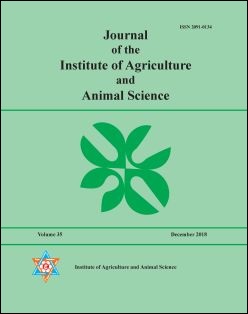Analyzing the Socioeconomic Determinants of Adoption of Climate Smart Agriculture in Nawalparasi District of Nepal
DOI:
https://doi.org/10.3126/jiaas.v36i1.48379Keywords:
adopter, benefit-cost ratio, binary logistic regression, climate change, seed bankAbstract
Climate change is an emerging global issue and its impact on agriculture of the developing countries has been increasing substantially in the last two-decade. Relevancy of issues how much the climate smart agricultural technologies were reaching at farm level and their economics of adoption were not properly studied in the past. Research examined the various climate smart agricultural technologies, the benefit of it and the socioeconomic factors affecting its adoption in the purposively selected Agyouli village of Nawalparasi district. For obtaining primary data from the respondents, 100 samples were selected by using a simple random sampling technique. The study was done by direct interviews and focus group discussions with the selected respondents through the means of questionnaires and checklist respectively in May 2018. The results of the primary information further complemented by using secondary data collected from the published sources. The community seed bank, green manure, biogas, legume intercropping, improved varieties, integrated pest management and integrated plant nutrient management as climate smart agricultural technologies in the farms of adopters contributed significantly higher farm income, productivity, gross income and benefit-cost ratio of paddy production for the adopters by NRs. 24377.9, 1.5 t ha-1, NRs. 35298.7 and 0.88 respectively than non-adopters. Further analysis of binary logistic regression model assessed the significant effect of age of household head, economically active household members and the training on the likelihood of adoption of climate smart agriculture. The study recommends climate smart agricultural technologies throughout the country in the changing context of climate change.

